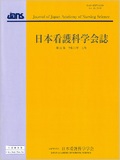Japanese
English
- 販売していません
- Abstract 文献概要
- 参考文献 Reference
要旨
目的:反すうの概念を分析し,その構造を明らかにすることにより看護実践における有用性を検討することである.
方法:91文献を対象として,Rodgersの概念分析アプローチを用いて分析した.
結果:属性には1カテゴリー【思考の制御困難】が得られた.先行要件には5カテゴリー,帰結には3カテゴリーが得られた.
結論:反すうは,【精神的苦痛】や【ストレス負荷】,【客観視の不足】,【注意の調節困難】,【生物学的特徴】によってもたらされる【思考の制御困難】であり,その結果【精神的健康の悪化】,【身体的健康の悪化】,【ストレスの増悪または立ち直り】が生じる.反すうの概念を看護実践に用いることは,既存の看護実践に新しい視点をもたらすことに貢献する.
Aim: To analyze the concept of rumination and shed light on its structure in examining the effectiveness of using the concept in nursing practice.
Methods: This study analyzed 91 papers by using Rodgers' concept analysis approach.
Results: The following one attribute category was extracted: “uncontrollable thoughts.” Five categories were extracted for prerequisites and another three for consequences.
Conclusion: The findings suggested that the concept of rumination means “uncontrollable thoughts” which people experience when they have “mental pain,” “negative belief,” “lack of objective vision,” “nonadjustable attention,” and “biologic profile.”
As a result of rumination, “aggravation of mental health,” “aggravation of physical health,” and “aggravation of stress or Recovery from the event” arise. To use the concept of rumination towards nursing, brings a novel viewpoint to the existing nursing practice.
Copyright © 2021, Japan Academy of Nursing Science. All rights reserved.


